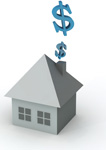Intro to "Buy a Home or Rent and Save?"
Try the calculator Buy a Home or Rent and Save? >
 At one point or another, in our lives, we are all confronted with the question of whether renting or buying a property is the best option. Both come with their own sets of advantages and disadvantages, and with both come qualitative and quantitative aspects to consider.
At one point or another, in our lives, we are all confronted with the question of whether renting or buying a property is the best option. Both come with their own sets of advantages and disadvantages, and with both come qualitative and quantitative aspects to consider.
The vast majority of people dream to become home owners, but there are many points to consider before deciding which option is best suited for you, whether it is buying a property or renting.
Using the calculator Buy a Home or Rent and Save? you are able to dig deeper and find out what the numbers are saying before making your decision.
There is a way to calculate, within a determined period, if it's financially more beneficial for you to buy or to rent. At first glance, many people will say that renting is a waste of money because essentially you are paying someone else’s mortgage, whereas, when you pay your own mortgage at the end of the day the asset is yours, and therefore paying your own mortgage becomes an investment.
An important point to consider is the interest payments you have to pay on the mortgage. Most times at the end of your term you will have paid probably close to half of your payments to the bank, in the form of interest payments, instead of your capital.
Other important points to consider when buying and owning a property are the related costs attached to it: purchasing costs such as agent's fees, inspection and notary fees, welcome and property taxes (municipal and school) as well as, of course, all the costs related to the property itself such as maintenance (electricity, heating, gas, etc.) and any related problems that might arise and could require renovations.
The "Buy a Home or Rent and Save?" Calculator
It is important to put things in perspective and quantitatively measure the two scenarios in order to make a clear judgement.
Let's take the following example. If you pay $1,500.00 towards your mortgage payment, at one point during the term, you will likely be paying $700.00 of capital and $800.00 of interest payments towards it. The interest portion will fluctuate in time; you always pay a higher amount of interest at first. This scenario would be similar to that of paying a rent of $800.00 and saving the other $700.00. In both these cases, you acquire an asset: a property or savings.
This $700.00 savings can be invested in low risk titles, such as government bonds or in the money market, where the rate and the risk is comparable to the $700.00 of capital paid towards the real estate asset. It is important to search for titles that pay interest every month (compound interest monthly) in order to gain interest on the interest. These savings will grow and fructify every month since you are adding an amount saved, and capitalizing the interests. In such a way, you can actually build an asset by renting, which can later on be used as a down payment for a property should you want to purchase one.
The goal of this table is to analyse quantitatively the two scenarios in order to know which transaction is financially better for you, without considering qualitative arguments. We consider in this table a person who wants to rent and save, and will invest his savings monthly in a low risk title with interest compound monthly. The assets are real estate or invested money, and they both gain value with time.
Equity Chart
In this chart, we remove from the value of the house the cumulated costs (interests, taxes and fees) and the balance left on the mortgage on a particular year. To compare, we also remove the cumulated rent from the value of the savings. We can then see the net evolution of the two investments: the equity. The greater the equity the better the choice.
Buying
- Value of the house - (property purchase costs + balance on the mortgage) = Equity buy
- Property purchase costs:
- Cumulated interests
- Cumulated taxes
- Cumulated fees
Renting
- Value of the investment - cumulated rent = Equity rent
Important aspects
An important point to consider is that saving money is usually a slow process, and it takes time and patience while it grows. In comparison, the purchase price of real estate is already considerable, so it's appreciation will be higher since it's applied to the original value.
Also, the amount you are able to put towards your down payment can strongly contribute in reducing the interests. Since the interests are calculated on the balance of the mortgage and the down payment is 100% a deposit on the capital, the total interest that you have to pay will drop, but the value of the property stays the same. The higher the down-payment, the lower your interest payments will be.
Try the calculator Buy a Home or Rent and Save? >




